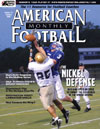AMERICAN FOOTBALL MONTHLY THE #1 RESOURCE FOR FOOTBALL COACHES
Article CategoriesAFM Magazine
|
Performance, Pain & FearIs Dealing with Fear, After an Injury, Important?by: Dr. Raymond J. Petras Elite Sports Performance & Injury Mgmt Specialist © More from this issue Most athletes experience some pain, whether it is physical or psychological, during a season. Sports medicine has focused on helping the body heal and getting many athletes get back onto the playing field quickly, after a physical injury. But are we overlooking some need? Is fear a factor in the speed and completeness of recovery? Critical Emotion, Neglected? In last month’s article: Injury: A Mind/Body & Spirit Relationship? I reported how two fullbacks and a middle linebacker returned to play, more quickly than expected, using only mental techniques. The fullback, diagnosed with a partial right shoulder a/c separation, was scheduled to start the game on Saturday. The prognosis was that he could play, but that it was his call based on his pain and range of motion. The game plan was for him to block ....The full article can only be seen by subscribers. Subscribe today!
|
|
|||||||
| HOME |
MAGAZINE |
SUBSCRIBE | ONLINE COLUMNISTS | COACHING VIDEOS |
Copyright 2025, AmericanFootballMonthly.com
All Rights Reserved





